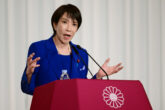May 08, 2018
The Trump Administration's Policy Toward Taiwan
Less than a month after the November 2016 election and several weeks before Donald Trump’s inauguration, U.S. policy toward Taiwan faced an early defining moment. On December 2, thepresident-elect received a congratulatory phone call from Taiwan’s president Tsai Ing-wen. The first direct presidential communication since 1979, the telephone connection appears to have been carefully orchestrated. The next week Trump said he was reconsidering the 40-year-old “one China” policy built on three U.S.-China joint communiqués, the Taiwan Relations Act, and other major policy statements. Yet in his first official phone call with China’s leader, President Trump reassured President Xi Jinping that the United States remained committed to the one-China policy. These early muscle movements of Taiwan policy revealed some of the characteristic negotiating tactics of both the author of The Art of the Deal and the Chinese government. President Trump, seeking to improve his bargaining position over Taiwan, provoked an early test with Beijing to announce that the United States would henceforth be less predictable than in the past. Meanwhile, China made clear that the only sure path to fruitful cooperation would require strict adherence to Chinese principles. These moves presaged future tension and competition, given that the Trump administration had every intention to seek peace but prevent coercion against the people of Taiwan: in other words, the new president accepted the one-China policy of the United States and not the one-China
Read the Full Article at NBR
More from CNAS
-
India-EU Trade Deal: A New Superpower Pact | PM Modi Holds Talks With EU Leaders
Lisa Curtis, Director of the Indo-Pacific Security Program at the Center for a New American Security, joined CNN News18 to discuss the recent India-EU trade deal. Watch the f...
By Lisa Curtis
-
Japan Wants Calm, China Not So Much
This article was originally published in Asian Military Review. One of the most serious China-Japan diplomatic crises in recent years unfolded in November after Chinese offici...
By Derek Grossman
-
America Must Salvage Its Relationship With India
The longer the current crisis lasts, the harder it will be to restore the relationship and the more likely it is that the two countries will lose an entire generation of progr...
By Richard Fontaine & Lisa Curtis
-
Indo-Pacific Security / Technology & National Security
AI and Policy, Both Foreign and DomesticIn an episode recorded just before Christmas, Darren interviews Janet Egan, Senior Fellow and Deputy Director of the Technology and National Security Program at CNAS, about AI...
By Janet Egan




